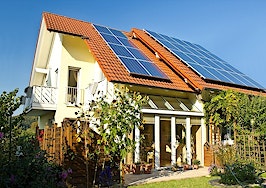If buyers knew their prospective new home could come with lower energy bills and be better for the environment, would they pay more for that home?
Two recent studies suggest they would. But many listing agents are not doing a good enough job promoting those features.
Rockville, Maryland-based Metropolitan Regional Information Systems Inc. (MRIS) is doing its part: The 45,000-plus member multiple listing service will be adding 14 new “high performance home” fields to its Keystone tool for adding and editing listings into its database on June 23, in addition to the more than 35 “green” fields MRIS already offers.
These fields will include whether or not a home offers Energy Star Cooling and Heating Systems, LEED (Leadership in Energy & Environmental Design) for Homes certification, and HERS (Home Energy Rating System) index scores.
The fields will be available as part of listing syndication feeds as long as third parties update their metadata, an MRIS spokeswoman told Inman. Third-party portals will determine which fields they want to make searchable on their end, she said.
“We want to make it easier for real estate professionals to help sellers promote the green features in their listings and to help buyers identify these homes which are more energy-efficient and eco-friendly,” said MRIS spokesman Jonathan Hill in a statement.
But the challenge might be getting its listing agents to actually use the fields. Only an estimated 14.8 percent of high-performance homes in Washington, D.C., were listed using existing green MLS fields between 2008 and 2013, according to a “Greening the MLS” study conducted by the nonprofit Institute for Market Transformation (IMT), in association with nonprofit Elevate Energy and MRIS subsidiary RealEstate Business Intelligence.
“[A]gent training and education will encourage adoption and greater use of the new green fields,” MRIS said in a study fact sheet.
In other markets, listing agents appear to use green MLS fields even less. According to the study, CoreLogic, which counts 140 MLSs as customers, estimates that when green fields are available in a given market, only 3 to 5 percent of listings actually use the fields.
According to the most recent (2010) data from the National Association of Realtors, 79 percent of the top 100 most populous metro areas have access to an MLS with green fields.
The “Greening the MLS” study found that, in 2013, sales of high-performance homes accounted for 18 percent of the total residential sales in Washington, D.C., and their median sales prices were 23 percent higher than homes that were not listed using at least one of the “green” MLS fields offered by MRIS.
“The initial indication of this data is that buyers are willing to pay a premium for [high-performance homes],” said Cliff Majersik, executive director of IMT, in a statement.
But the study cautioned that it would be “imprudent” to conclude that such a premium exists without further rigorous analysis. This particular study, for instance, did not control for variables such as home size and location or for which or how many green fields listing agents used.
Still, Majersik noted that the findings are inline with other recent studies that show that green premiums do exist in the residential housing market.
Another recent analysis by Elevate Energy in the the Chicago market bears this out. The study indicated that homes that disclosed energy costs at the time of listing in the local MLS, Midwest Real Estate Data LLC (MRED), sold at a higher percentage of the asking price.
On average, an attached home (condominium or townhome) that was listed for $352,000 would have sold for $4,576 more if the listing had disclosed the home’s energy costs, MRED said in a press release.
Attached homes that disclosed energy costs spent about 25 fewer days on the market compared to homes that did not disclose energy costs and detached homes that disclosed energy costs spent eight fewer days on the market, MRED added.
Agents are required to comply with an energy cost disclosure ordinance in the city of Chicago. Therefore, MRED launched an “Energy eCompliance” tool to help listing agents in Chicago provide buyer’s agents and home purchasers with immediate online access to an energy cost disclosure report for a property.
Earlier this year, MRED, the City of Chicago and Elevate Energy rolled out a “challenge” encouraging all of the area’s agents and real estate firms to commit to three things:
- Using digital energy cost disclosure fields offered by MRED on all eligible Chicago property listings.
- Assigning an office staff member to oversee training activities on the Energy eCompliance tool.
- Making energy cost disclosure fields provided by MRED part of the brokerage’s listing process.




